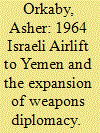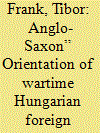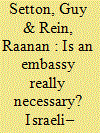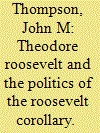|
|
|
Sort Order |
|
|
|
Items / Page
|
|
|
|
|
|
|
| Srl | Item |
| 1 |
ID:
142874


|
|
|
|
|
| Summary/Abstract |
Based on oral history accounts of surviving members of Israel[#x02019]s first International Squadron and organisers of the military airlift to Yemen in 1964, this analysis examines the origins of the squadron, its mission to Yemen, and its impact on Israeli foreign policy in Africa. The founding of the International Squadron in 1963 incorporated the Boeing 377 Stratocruiser into the Israeli air force and gave the military and Foreign Ministry the country[#x02019]s first long-distance transport capability. The initial successful military airlift to Yemen in May 1964 opened the possibility for additional clandestine military aid missions to sub-Saharan Africa and Kurdistan and marked the beginning of an era of Israeli [#x0201C]weapons diplomacy.[#x0201D] The Squadron[#x02019]s incorporation of more advanced transport planes during the 1970s presented the Foreign Ministry with the capability of reaching Latin America and Asia, an essential factor in Israel[#x02019]s expanding global arms market and later humanitarian missions.
|
|
|
|
|
|
|
|
|
|
|
|
|
|
|
|
| 2 |
ID:
142871


|
|
|
|
|
| Summary/Abstract |
The political élite of Hungary included a group that expected British and American support for Hungarian revisionist claims after the Paris Peace Conference. Their acknowledged leader was Count István Bethlen, the prime minister from 1921 to 1931 and an adviser to Regent Vice-Admiral Miklós Horthy until 1944. This analysis investigates a largely forgotten member of this group. Antal Ullein-Reviczky, a diplomat and scholar, shifted from being a Hungarian nationalist with an anti-Nazi attitude towards secret efforts to establish political relations with Britain during the Second World War. Press chief of the Foreign Ministry and the prime minister’s office, Ullein-Reviczky’s last appointment was Hungarian minister at Stockholm in 1943–1944. Both the Germans and the British put little trust in a man whose wife was the daughter of a British diplomat, yet who maintained superb connexions in pro-German Hungary. He changed his mind gradually when he realised that the price for revising the Treaty of Trianon was unacceptable. His long journey through international politics made him a significant player in a global drama, also assisting Raoul Wallenberg’s mission to Budapest. It is a political odyssey worth remembering.
|
|
|
|
|
|
|
|
|
|
|
|
|
|
|
|
| 3 |
ID:
142876


|
|
|
|
|
| Summary/Abstract |
The ability of the parties to the United Nations Framework Convention on Climate Change to negotiate an effective agreement for the post-2020 period is highly dependent on whether developing countries should take on binding mitigation commitments. This analysis combines an historical with a discursive institutionalist perspective to trace the conflict around developing country mitigation that accompanies the climate change regime since its inception. The article shows that early decisions on the subject matter shaped the regime until now. At the same time, the discourse and more recent decisions concerning developing country mitigation indicate gradual changes nevertheless. In particular, the Conferences of the Parties in Bali 2007 and Durban 2011 produced outcomes that changed the institutional architecture of the regime significantly. The development of the climate regime regarding developing country mitigation is hence marked by both periods of change and stasis.
|
|
|
|
|
|
|
|
|
|
|
|
|
|
|
|
| 4 |
ID:
142878


|
|
|
|
|
| Summary/Abstract |
In “J.M. Keynes and the Personal Politics of Reparations,” Parts I and II, published in Diplomacy and Statecraft (2014), the American historian Stephen Schuker claims that Keynes’ scientific arguments against the policy of reparations were distorted by both political passion and his emotional attachment to the German banker, Dr. Carl Melchior. He provides no evidence for this argument, and Keynes’ analytic positions emerges without reference to either.
|
|
|
|
|
|
|
|
|
|
|
|
|
|
|
|
| 5 |
ID:
142875


|
|
|
|
|
| Summary/Abstract |
Spanish–Israeli relations expanded across numerous fields throughout the 1960s despite the absence of formal diplomatic ties. For all practical purposes, Israel’s Ministry of Foreign Affairs had a legation in Madrid during the second half of the 1960s, including at least 3 semi-official representatives operating with the full knowledge of Madrid. Clandestinely, a Mossad station worked in liaison with the local intelligence services. Absence of a full-fledged Israeli embassy did not prevent advancing bilateral ties, normalising Jewish affairs in Spain, or preventing both Powers from engaging in official and public occasions or behind the scenes. Systemic pressure, most evident in Madrid’s ascension to GATT, and the need to abide with its rules by liberalising trade with Israel did much to advance Spanish–Israeli bilateral ties in the 1960s. A strong systemic external force also brought change in their relations in the 1980s. The diplomatic breakthrough of January 1986 and establishment of full formal diplomatic relations between the Powers was largely the inevitable result of Spain’s entry into the European Economic Community.
|
|
|
|
|
|
|
|
|
|
|
|
|
|
|
|
| 6 |
ID:
142873


|
|
|
|
|
| Summary/Abstract |
From 1948 to 1950, the United Nations (UN) endeavoured to promote the internationalisation of Jerusalem, which had been a key element of the 1947 Palestine “Partition Plan.” Even though the war that erupted in Palestine in 1948 put paid to partition, 2 UN resolutions re-affirmed the decision to place the city under international auspices. On the opposite side stood Israel and Jordan, both of which ruled the city and were interested in frustrating the attempt to remove it from their control. This identity of interests stirred them to try to reach agreement to divide Jerusalem and make internationalisation superfluous. Unlike other studies that examine the contacts between Israel and Jordan during this period, this analysis examines the Jerusalem question as an independent issue and focuses on the moves made by Israel and Jordan during their covert negotiations in light of the UN decision to internationalise the city.
|
|
|
|
|
|
|
|
|
|
|
|
|
|
|
|
| 7 |
ID:
142872


|
|
|
|
|
| Summary/Abstract |
This analysis traces the evolution of the denazification programme in American-occupied Germany from 1945–1948. At the close of the Second World War, high-level American policy-makers proclaimed their determination to drive all Nazis out of power. However, the realities of denazification differed from American officials’ goals; additionally, their objectives in Germany dramatically changed over time. Monitoring German public opinion about the occupation, and keeping public opinion positive, proved of central importance to Military Government officials. They actively promoted denazification in an attempt to bolster German attitudes toward the programme. Using Office of Military Government of the United States documents, this analysis examines the decision to wind down the American denazification programme and shows that the decision came in April 1947 because of negative German public opinion. In place of denazification, American Military Government officials recommended increasing emphasis on reorientation.
|
|
|
|
|
|
|
|
|
|
|
|
|
|
|
|
| 8 |
ID:
142877


|
|
|
|
|
| Summary/Abstract |
This analysis examines the evolution of Austrian participation in international peace—and peacekeeping—operations from 1960 to the present. In doing so, the emphasis is not on the missions themselves, nor the role played by Austrian contingents over the years in various theatres of operation.1 Rather, this exegesis scrutinises the political motivation behind the decision to deploy peacekeepers, to which extent these were conscientious decisions taken by the government for specific reasons, and the role played by other factors.
|
|
|
|
|
|
|
|
|
|
|
|
|
|
|
|
| 9 |
ID:
142869


|
|
|
|
|
| Summary/Abstract |
There is a broad consensus about the ways in which public opinion and domestic politics influenced American foreign policy during Theodore Roosevelt’s presidency. Historians generally concur that the American public was ignorant about and uninterested in international politics. They also agree that the president’s perception of public sentiment and his reading of the political landscape played essentially negative roles; that is, they were constraints at the point of implementation, rather than factors that shaped the substance of his policy, and were unquestionably a hindrance. Taking a fresh look at the origins of the Roosevelt Corollary to the Monroe Doctrine raises questions about this interpretation. Roosevelt believed that Americans were passionately opposed to the blockade of Venezuela by European Powers in late 1902 and early 1903 and viewed it as a threat to the Monroe Doctrine. This perception and Roosevelt’s 1904 presidential campaign therefore significantly affected the timing and content of the Roosevelt Corollary.
|
|
|
|
|
|
|
|
|
|
|
|
|
|
|
|
|
|
|
|
|